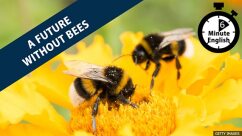Georgina
Hello This is 6 Minute English, I'm Georgina
Rob
And I'm Rob
Georgina
What do you do when you’re tired, Rob?
Rob
Mm, I go to bed
Georgina
Before that?
Rob
Erm, I clean my teeth?
Georgina
But what does your body do to tell you you’re tired?
Rob
Right, well these days I just kind of fall asleep in front of the TV
Georgina
Yes, but, OK – what am I doing now?
Rob
Oh yes, hang on – yes, you’ve set me off - yawning, yes yawning is a sign that we
are tired! Or bored!
Georgina
Are you tired or bored now?
Rob
No, not particularly
Georgina
So, why did you just yawn?
Rob
Well, because you did! That’s the thing about yawns They are contagious – they
can spread from one person to another
Georgina
And that’s what we’re looking at in this programme But first, today’s question
What biological function does yawning have? Essentially, why do we yawn? Is it:
A: To take in more oxygen
B: To get rid of carbon dioxide from our body
C: No one really knows
What do you think, Rob?
Rob
Ah – I know this We yawn to take in more oxygen I’m pretty sure that’s it
Georgina
OK We’ll see if you’re correct at the end of the programme John Drury is a
researcher from Sussex University On the BBC Radio 4 series All in The Mind he
spoke about yawning and why it is contagious Which animal does he mention
will also catch a yawn from its owner?
John Drury
Yawning is actually a difficult case when it comes to
these contagious behaviours It is the most contagious behaviour – it’s meant to
be automatic, it’s something that you can’t stop Dogs yawn when their
owners yawn, animals yawn to each other It happens whether you want to or
not These kind of effects have been found for other kinds of behaviour, so really,
we were trying to push it as far as we could and see if there is
a cognitive element to this influence behaviour
Georgina
Which animal might yawn when its owner does?
Rob
Dogs! Dogs can catch a yawn from their owners
Georgina
Yes, yawning is a very contagious behaviour The use of the word behaviour
here is interesting Normally it is an uncountable noun to describe the way we act
– either in a good or a bad way We talk about, for example, dogs’ or children’s
behaviour being good or bad
Rob
But it’s also used as an uncountable noun when we are talking about a particular
action that, for example, an animal makes in particular situations These
behaviours are often not conscious, but are an automatic response to a situation
Georgina
And the researchers were looking to see if there was a cognitive side to the
behaviour Which means they are looking at the mental process – what is
happening in the mind to make us yawn, particularly when someone else yawns
Let’s listen again
John Drury
Yawning is actually a difficult case when it comes to
these contagious behaviours It is the most contagious behaviour – it’s meant to
be auto matic, it’s something that you can’t stop Dogs yawn when their
owners yawn, animals yawn to each other It happens whether you want to or
not These kinds of effects have been found for other kinds of behaviour, so
really, we were trying to push it as far as we could and see if there is
a cognitive element to this influence behaviour
Georgina
The research discovered that contagious yawning is connected with our social
group and how close we feel to the people in it Here’s John Drury again
John Drury
So, the more that you identify with the in-group target, the more likely you are
to copy their behaviour What we do when we see a behaviour is that at some
level, we are making a judgement about whether the person exhibiting that
behaviour, whether it’s an emotion, or a scratching behaviour, or anything, is
relevant Does their behaviour indicate to us how we should behave?
Georgina
So, essentially, yawning is more contagious if we identify with the person who
yawns first If we feel close to, and belong in, the same group as the person who
exhibits the behaviour – the person who does the yawning – we are likely to
yawn too
Rob
So, you are less likely to yawn if a stranger yawns than if someone in your close
family or circle of friends yawns
Georgina
Let’s listen again
John Drury
So, the more that you identify with the in-group target, the more likely you are
to copy their behaviour What we do when we see a behaviour is that at some
level, we are making a judgement about whether the person exhibiting that
behaviour, whether it’s an emotion, or a scratching behaviour, or anything, is
relevant Does their behaviour indicate to us how we should behave?
Georgina
Right, before we review the vocabulary, let’s have the answer to our quiz Why do
we yawn? Is it:
A: To take in more oxygen
B: To get rid of carbon dioxide from our body
C: No one really knows
Rob, what did you say?
Rob
Well, I was pretty sure it’s A - to take in more oxygen
Georgina
There is, in fact, no clear biological reason for yawning that is agreed upon So no
one really knows
Rob
We’ve been talking about yawning The action of opening our mouths wide open
and stretching our eardrums when tired or bored
Georgina
Yawning can also be contagious This means it can pass from one person to
another
Rob
And a yawn can be described as a behaviour – a particular kind of automatic
action in response to a particular situation
Georgina
The word cognitive is related to our mental processes - the way our minds work
Rob
If you identify with a particular group – you feel close to that group and feel that
you belong in that group
Georgina
And finally, to exhibit a behaviour is to actually do that particular behaviour
And before we all start yawning, it’s time for us to go Do join us again soon and
you can always find us online, on social media and on the BBC Learning English
app Bye for now
Rob
VOCABULARY
a yawn / to yawn
breathe in and out with our mouth stretched open
contagious
can be spread from one person to another
a behaviour
an action, often automatic, in response to a particular situation
cognitive
connected to mental processes and the way our minds work
to identify with (a group)
to feel close to and have a sense of belonging to (a group)
exhibit (a behaviour)
do, show (a behaviour
Bye!









